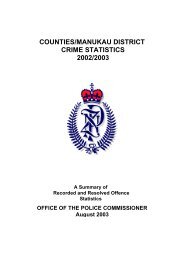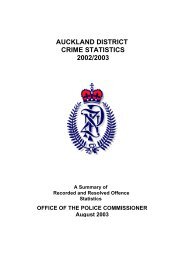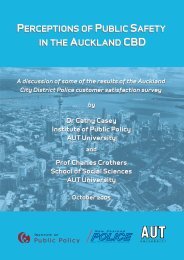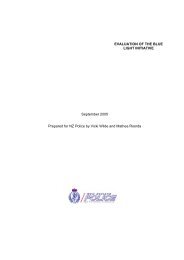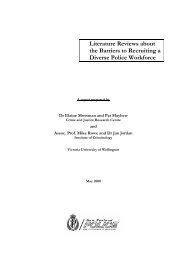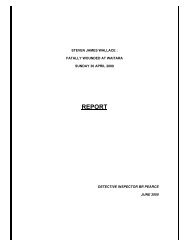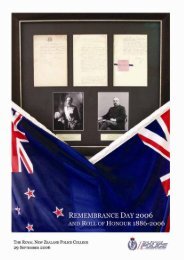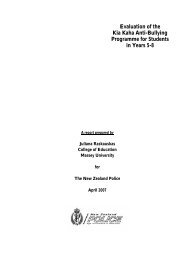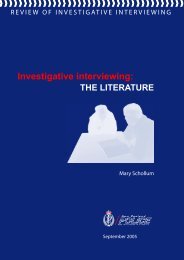Police Perceptions of Maori - Rethinking Crime and Punishment
Police Perceptions of Maori - Rethinking Crime and Punishment
Police Perceptions of Maori - Rethinking Crime and Punishment
You also want an ePaper? Increase the reach of your titles
YUMPU automatically turns print PDFs into web optimized ePapers that Google loves.
Method<br />
Questionnaire design<br />
In addition to questions about their background, respondents were asked questions<br />
about the behaviour <strong>of</strong> the police generally in relation to <strong>Maori</strong>, their own views <strong>of</strong><br />
<strong>Maori</strong> <strong>and</strong> about possible police policy <strong>and</strong> strategy. It was also agreed between the<br />
researchers <strong>and</strong> their clients that it was important to state the purpose <strong>of</strong> the research<br />
directly as being to explore police attitudes, behaviour, policies <strong>and</strong> strategies in<br />
relation to <strong>Maori</strong>. Attempts to conceal the true purposes <strong>of</strong> the study would be<br />
inappropriately deceptive <strong>and</strong> were also likely to be ineffective <strong>and</strong> counterproductive.<br />
<strong>Police</strong> behaviour<br />
A number <strong>of</strong> situations where police behave differently to those who are ethnically<br />
dissimilar to the white majority were identified from previous overseas research (Smith<br />
& Gray, 1985; Reiss, 1971). It was decided to ask respondents directly about their<br />
views <strong>of</strong> police behaviour in general <strong>and</strong> in specific situations. Respondents were<br />
asked for each possible police action: "In general, are the police more likely to do the<br />
following when the person is <strong>Maori</strong>, Caucasian 1 , or is it the same for both?"<br />
A relatively objective measure <strong>of</strong> inappropriate behaviour used by Smith <strong>and</strong> Gray<br />
(1985) was the extent to which complaints were lodged against <strong>of</strong>ficers for behaviour<br />
such as: assault, excessive or unnecessary force, fabrication or adjustment <strong>of</strong> evidence,<br />
accepting bribes or favours, rudeness, treating people unfairly because <strong>of</strong> race, failure<br />
to attend or help when requested. This option was rejected as too sensitive to ask<br />
about in the context <strong>of</strong> a postal questionnaire. However, other options suggested by<br />
Smith <strong>and</strong> Gray's research were adopted. Respondents were asked to estimate the<br />
percentage <strong>of</strong> <strong>of</strong>ficers who had negative attitudes to <strong>Maori</strong> <strong>and</strong> whether or not<br />
supervisors reprim<strong>and</strong>ed <strong>of</strong>ficers who behaved negatively to <strong>Maori</strong>. For comparison,<br />
similar questions were asked about the percentage <strong>of</strong> <strong>of</strong>ficers with negative attitudes<br />
towards peoples <strong>of</strong> Pacific Isl<strong>and</strong> <strong>and</strong> Asian descent.<br />
Finally, questions on behaviour in general were asked about relationships between<br />
<strong>Maori</strong> <strong>and</strong> non <strong>Maori</strong> police <strong>of</strong>ficers <strong>and</strong> about differences in their ability to deal with<br />
various situations. The situations respondents were asked about were identified as<br />
those associated with differences in previous research (Smith & Gray, 1985) or<br />
mentioned during piloting the research.<br />
<strong>Police</strong> <strong>of</strong>ficers' attitudes<br />
A number <strong>of</strong> options for exploring the police <strong>of</strong>ficers' own views were considered.<br />
The first was to use a st<strong>and</strong>ard scale designed to measure authoritarianism or racism.<br />
1 Considerable debate occurred about what shorter phrase to use for New Zeal<strong>and</strong>ers <strong>of</strong><br />
European descent. It was expected that there would be objections to being called Pakeha from<br />
many police <strong>of</strong>ficers. It was eventually decided to use the word 'Caucasian'. This word might<br />
seem <strong>of</strong>fensive to many New Zeal<strong>and</strong>ers because <strong>of</strong> its historical use in relation to racial purity<br />
by fascist groups but it is the st<strong>and</strong>ard option used by the police on the Wanganui computer<br />
<strong>and</strong> hence one the police were accustomed to using. And indeed no one objected to this word<br />
although several objected to the use <strong>of</strong> the word 'Pakeha' in a question on ethnicity worded to<br />
match the census format.<br />
3



